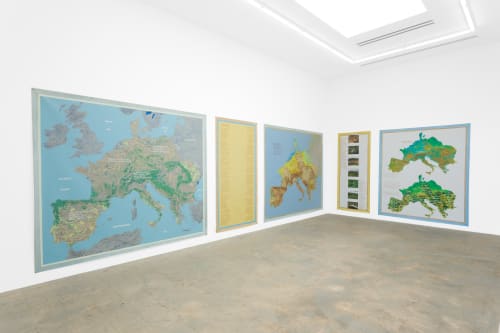Various Small Fires is pleased to present its second solo exhibition by The Harrisons.
Newton Harrison worked from 1969 to 2012 with his wife Helen Mayer Harrison (1927-2018), and has continued to work alone since her passing. After reading Rachel Carson’s Silent Spring in the late 1960s, The Harrisons decided to only create artworks that benefit “the great web of life”, leading over many years of research and production to the genesis of the Ecological Art movement. Decades later, despite the prescience of The Harrisons and others, the planet finds itself on a short path to the sixth extinction.
In 2007, The Harrisons began to design and realize interdisciplinary works, employing a range of mediums, including landscape-scale living installations, that would not only protect the life web, but actually counter human destruction by stimulating the life web to assist in its own amelioration. The artworks collected in this exhibition, dating from 1970 to the present, demonstrate this singular approach proposed by The Harrisons to mediate the extinction of our natural world, and provide a rough and ready blueprint for countering the extinction now upon us.
Newton Harrison and his team at the Center for the Study of the Force Majeure at University of California, Santa Cruz, continue to develop and implement projects at large-scale across the globe, “aware of the short time remaining for humans to counter the devastating effect of their own greed”. Now 86 years old, Newton is profoundly encouraged by the rising movement of young environmental activists around the globe, led by Greta Thunberg, who he considers to be answering his (and Helen’s) words from their works The Lagoon Cycle (1979) and Serpentine Lattice (1993).
Who will pay this eco debt
and were will we find eco credits
to put against it
as ecosystems simplify
and become minimally productive
…
who will pay the cost of the loss of plants and herbs
whose medicinal values
are as yet unknown
and the price
when sequestering of carbon
by succession of ecologies diminishes
and who will pay the costs
of apparently unsupervised
aggressive clear cutting on private lands
all this long term energy debt
comes due in the next generation.
from Serpentine Lattice, 1993
And the tropics
Will become uninhabitable
And the far north
Will become temperate
…
And most life
known and unknown
named and unnamed
will have to grow elsewhere than now
…
and in this new beginning
this continuously rebeginning
you will feed me
when my lands no longer produce
and I will house you
when your lands are covered with water
and together we will withdraw
as the waters rise.
from The Lagoon Cycle, 1979
—
The Harrisons Studio consists of Newton Harrison (b. 1932) and Helen Mayer Harrison (1927—2018). Often simply referred to as “The Harrisons”, the husband and wife team are leading pioneers of the Ecological Art movement. During their prolific career, the Harrisons have been the subject of over 100 solo exhibitions, and have been included in over 250 group exhibitions. For nearly fifty years, the Harrisons have produced work across a vast range of disciplines, working in collaboration with biologists, ecologists, historians, activists, architects, urban planners and fellow artists to initiate dialogues and create works exploring biodiversity and community development. They have shown work at the 2019, 1980, and 1976 Venice Biennales; Taipei Biennial (2018); documenta 8 (1987); the Los Angeles County Museum of Art, CA; The Whitney Museum of American Art, New York, NY; Museum of Modern Art, New York, NY; The Tate, London, UK; Museum of Contemporary Art Los Angeles, CA; The Hirshhorn Museum, Washington, D.C.; Cooper Hewitt Museum, New York, NY; Museum of Contemporary Art, Chicago, IL; MoMA PS1, New York, NY; Berkeley Art Museum, CA; Boston Museum of Fine Arts, MA; San Francisco Museum of Modern Art, CA; Kunstmuseum Bonn, DE; and Kunstverein Hamburg, DE. Works by the Harrisons are included in many major permanent collections including the Centre Pompidou, Paris, FR; The Museum of Modern Art, New York, NY; the Los Angeles County Museum of Art, CA; and the Museum of Contemporary Art, Chicago, IL. Newton Harrison is a Professor Emeriti at University of California, Santa Cruz, and University of California, San Diego.


